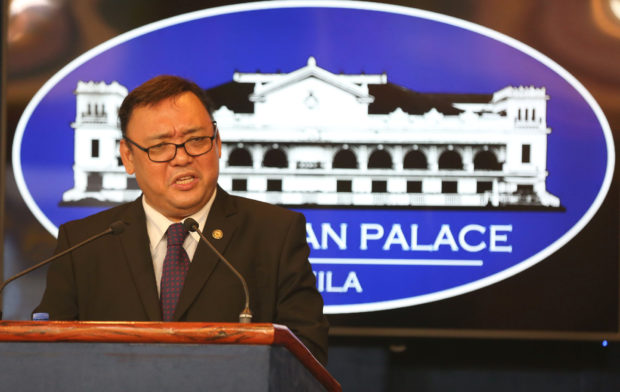
Presidential Spokesperson Harry Roque. INQUIRER PHOTO/JOAN BONDOC
Presidential spokesperson Harry Roque has issued nuanced, if not cordial, statements over Manila’s territorial dispute with Beijing in the West Philippine Sea following President Duterte’s diplomatic pivot to China.
From a staunch critic of China, Roque said on Thursday that Mr. Duterte’s decision to resolve the sea row “based on bilateral consensus via bilateral channels” with China would not affect the arbitral ruling.
The July 2016 ruling of the UN-backed Permanent Court of Arbitration invalidated China’s sweeping claims in the South China Sea on historical grounds and clarified the Philippines’ rights to its exclusive economic zone (EEZ) in the waterway.
In January this year, amid reports that the Duterte administration was taking into serious consideration the possibility of a joint exploration with China of natural resources in the West Philippine Sea, Roque said that such move would be a constitutional exercise of sovereignty and “not surrender.”
Roque, a member of the pro-Duterte House minority bloc, was handpicked by the President to serve as his spokesperson last month.
“Entering into mutual agreements with respect to natural resources is an exercise of state sovereignty, and not its surrender,” Roque said, citing Article 12, Section 2 of the Constitution.
But earlier, in 2012, following a two-month standoff between Philippine and Chinese ships at Panatag (Scarborough) Shoal, Roque, in a commentary published in the Inquirer on June 4 of that year, said that Philippine officials should beware and disabuse themselves of any notion that the no-fishing policy China just announced by the latter meant a Chinese retreat from Panatag.
‘Classic Chinese shadow play’
“It is a classic Chinese shadow play with Manila being lured back into the table of negotiations,” according to Roque, an expert in international law.
“The Philippine policymakers should realize that the country can only get nowhere in negotiations with China which, by all indications, would prefer to let the controversy as is, that is, pending and unresolved rather than risk international arbitration with no clear positive outcome for itself,” he added.
In January 2013, Roque praised the government’s move to take China before the UN arbitral tribunal to settle disputes in the West Philippine Sea.
Roque hailed in particular the framing of the Philippine government’s case, saying in a commentary published on June 25, 2013, in the Inquirer, that “credit goes to the Solicitor General [Francis Jardeleza] because our submission of claims is crafted in a manner that will exclude all of China’s reservations.”
Speaking at the fifth annual meeting of the Japan Society of International Law in June 2014, Roque said China’s snub of the Philippine arbitral claim on the West Philippine Sea and the slew of building projects initiated by Beijing on disputed reefs in the area are “a serious and belligerent violation” of the UN Convention on the Law of the Sea (Unclos).
Being a signatory to the Unclos, China “agreed to refer all matters involving interpretation and application of the Unclos to the compulsory and binding dispute settlement procedure of the convention,” Roque said. —INQUIRER RESEARCH Source: Inquirer Archives